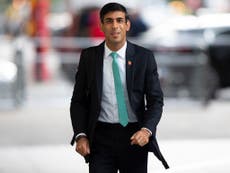Businesses hail Rishi Sunak’s ‘hugely generous’ job support package
New measures give lifeline to firms but thousands of jobs already lost due to delay in fixing flawed support scheme
Pubs, bars and restaurants have hailed a “hugely generous” £13bn package of support unveiled by Rishi Sunak, including changes to the furlough replacement scheme, help for the self-employed and grants for businesses affected by local lockdowns.
But opponents and experts asked why more was not done sooner to prevent thousands of people losing their jobs.
And Andy Burnham, mayor of Greater Manchester, said he was left “open-mouthed” in astonishment as the chancellor turned on the spending taps for tier 2 areas like London just days after his city was refused an additional £5m to help its businesses weather the strictest tier 3 restrictions.
Mr Sunak told the House of Commons he was acting in response to the “profound economic uncertainty” experienced by businesses which are allowed to remain open but have found the impact of health restrictions “worse than they hoped”.
He acknowledged the strain the second wave of the virus was placing on communities living under coronavirus curbs and warned of “difficult days and weeks ahead”.
“I understand your frustration, people need to know this is not forever,” said the chancellor. “These are temporary restrictions to help control the spread of the virus.”
After weeks of sustained pressure, and with just days to go before his furlough scheme ends, Mr Sunak bowed to calls for bigger government contributions to wages.
Westminster will now pick up about 60 per cent of workers’ wages for hours not worked, up from 33 per cent under previous plans.
Employers’ minimum contributions will be cut from 33 per cent to 5 per cent, making it much easier for struggling businesses to retain staff.
That pleased no one more than the country’s hospitality businesses, which are being hit hard by renewed fears about rising case numbers – and an enforced 10pm closing time.
Pubs in areas under tier 2 restrictions had “felt like they had the worst of all worlds”, with additional rules reducing trade further but without receiving additional support, said Tom Stainer, chief executive of the Campaign for Real Ale. “So these new financial support packages will be warmly welcomed by the beer and pubs sector.”
Pubs and brewers will now have a much better chance of surviving, he said.
The chancellor also outlined grants of up to £2,100 per month for businesses under tier 2 restrictions in England that can remain open but are seeing a significant drop-off in trade.
Grants will be backdated to August for areas such as Greater Manchester that have already been under restrictions for some time, heading off Labour criticism that the government has neglected the needs of much of the country with its support measures.
Anneliese Dodds, the shadow chancellor, branded Mr Sunak’s announcements as “a patchwork of poor ideas rushed out at the last minute” and questioned why “this is the right thing to do now, but wasn’t when parts of the north and midlands” were put under restrictions months ago.
Kate Nicholls, chief executive of UKHospitality, which represents pubs, bars, hotels and restaurants across the country, said it was a “hugely generous package of support”.
“The changes to the job support scheme [JSS] will help to safeguard hundreds of thousands of jobs and the grant support will provide a crucial lifeline for businesses struggling with low footfall and ongoing costs.
“It is excellent that the grant has been backdated to when the restrictions began to bite.”
The new measures will protect 2 million more people from redundancy than the previously announced job support scheme, according to calculations by the New Economics Foundation.
The JSS had been widely criticised for making it cheaper to sack staff than to keep them on at reduced hours.
Yet, while the new measures are significantly more generous, they leave about 450,000 jobs unprotected and do nothing to help those already out of work due to the delay in fixing flaws in the scheme, the NEF said.
NEF chief executive Miatta Fahnbulleh welcomed the announcement but said further improvements were needed.
“Now the chancellor needs to address the other gaps in his plan. Full furlough for businesses that are being asked to shut down for months on end,” Ms Fahnbulleh said. “Support for millions of excluded. And a minimum income guarantee to bolster support for many that have and will lose their jobs this winter.”
As currently designed, the scheme may advantage older workers at the expense of their younger colleagues, said Andrew Sanford, a partner at accountants Blick Rothenberg.
He pointed out that, while employers’ contributions have decreased, they must still pay national insurance and pensions.
“For businesses with no funds, redundancy and liquidation maybe the only option available,” he said. “Older workers may have more years of service and so redundancy costs may mean they are retained compared to a new joiner.
“Some additional funding for the under-25s in covering their employer’s national insurance would have been welcomed.”
Mr Sunak also doubled the value of upcoming grants for the self-employed from 20 per cent to 40 per cent of average profits, increasing their maximum value from £1,875 to £3,750.
The Treasury declined to put a precise figure on the total cost of the support, which will depend on how long restrictions last and the level of take-up.IPSE, the representative body for self-employed workers, said there remain “deep structural problems” with the system.
Subscribe to Independent Premium to bookmark this article
Want to bookmark your favourite articles and stories to read or reference later? Start your Independent Premium subscription today.






Join our commenting forum
Join thought-provoking conversations, follow other Independent readers and see their replies
Comments